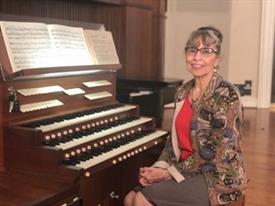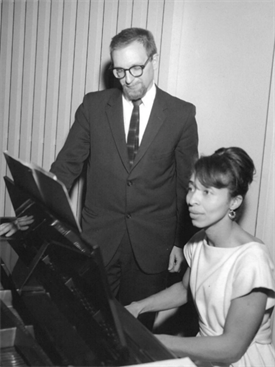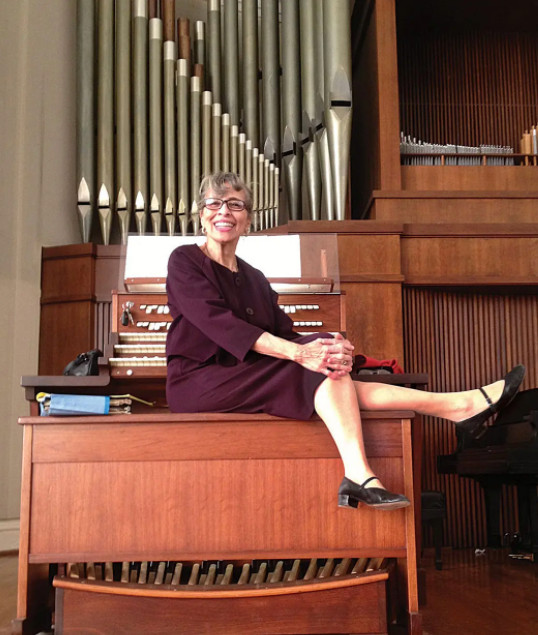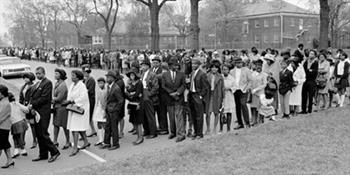Dr. Joyce Johnson Gives Spelman and the World the Gift of Music
"I could play all day." -- Dr. Joyce Finch Johnson
 On Jan. 27, 2024, professor emerita of music and Spelman’s beloved organist Dr. Joyce Finch Johnson, was feted at the Not Alone Foundation Inc. 8th Annual Diamonds Awards ceremony with the Diamonds Award Lifetime Achievement in Music Education. The educational leadership award signifies Dr. Johnson’s dedication and service to Spelman College and the world, while embracing philanthropy, humanitarian efforts and servant leadership.
On Jan. 27, 2024, professor emerita of music and Spelman’s beloved organist Dr. Joyce Finch Johnson, was feted at the Not Alone Foundation Inc. 8th Annual Diamonds Awards ceremony with the Diamonds Award Lifetime Achievement in Music Education. The educational leadership award signifies Dr. Johnson’s dedication and service to Spelman College and the world, while embracing philanthropy, humanitarian efforts and servant leadership.
From 1953 to 2024, Spelman students have witnessed Johnson at every special occasion at the College in her role as the College organist — from convocation to Founders’ Day, investitures and commencement — Johnson is a fixture as much as the Holtkamp organ at the center of Spelman’s historic Sisters Chapel.
For the artist’s many accolades as a global performer, music theorist and teacher, she is perhaps most well-known for being the organist who kept a two-day vigil, playing as Dr. Martin Luther King Jr. lay in repose at Spelman College Sisters Chapel for public viewing in April 1968.
On the 50th anniversary of the assassination of Dr. Martin Luther King Jr., Johnson was interviewed by WABE and discussed her tenure at Spelman, the history of the iconic Holtkamp organ, her views on Civil Rights gains and the importance of America’s historically Black colleges and universities. She was also interviewed for Vox Humana.
Service to Spelman College and the World
Here we share Dr. Joyce Johnson "In Her Own Words" in a blend of these interviews.
"I’ve only had one job my whole life, that’s at Spelman College."
 I was invited to Spelman College through a relationship with Mr. James, the Glee Club director at Spelman College and John Work, an eminent composer and arranger at Fisk University. Apparently, there was a need at Spelman College for a theory teacher and an accompanist for some of the organizations here and particularly for a theory teacher and I may have been a good student at Fisk and was, they say highly recommended for the position at Spelman. It certainly was unusual to get a college teaching position with just a bachelor’s degree.
I was invited to Spelman College through a relationship with Mr. James, the Glee Club director at Spelman College and John Work, an eminent composer and arranger at Fisk University. Apparently, there was a need at Spelman College for a theory teacher and an accompanist for some of the organizations here and particularly for a theory teacher and I may have been a good student at Fisk and was, they say highly recommended for the position at Spelman. It certainly was unusual to get a college teaching position with just a bachelor’s degree.
When I came to Spelman the following summer [in 1953], I immediately began my masters work at Northwestern University, attending Northwestern every summer for four summers and coming back to teach during the school year and then later taking a leave of absence to complete my doctorate. Why did I choose Northwestern? Because of segregation.
It is not widely known that African Americans were not even permitted to enter Southern universities for graduate study; students of color were sent out of state, including to major institutions, with all expenses paid by the respective Southern states. That accounts for my graduate study at Northwestern University in Illinois, from which I earned the Master of Music and the Doctor of Music degrees, both in piano. The State of Georgia actually paid all my expenses for my education at Northwestern University those four summers.
 Spelman College has always had exceptional students, extremely dedicated faculty, strong administrative leadership and good external financial support. It has been and is a place where both students and faculty are given every opportunity to develop skills for leadership and service to the community. It has been and continues to be an institution that celebrates diversity and inclusiveness. Given these characteristics, it has been a rewarding place to work, grow, and serve.
Spelman College has always had exceptional students, extremely dedicated faculty, strong administrative leadership and good external financial support. It has been and is a place where both students and faculty are given every opportunity to develop skills for leadership and service to the community. It has been and continues to be an institution that celebrates diversity and inclusiveness. Given these characteristics, it has been a rewarding place to work, grow, and serve.
This does not mean that there have been no challenges. Because of the location of the college in the heart of the “deep South” prior to the Civil Rights Movement, there were oppressive limitations on all African Americans and other minority groups due to the segregation laws of the land. Although the quality of education was always exceptional at Spelman College, it was challenging to provide the complementary rich, cultural experiences expected for a well-rounded higher education. These experiences were denied to people of color in Atlanta at that time.
Humanitarian Efforts

However, with the help of various organizations and foundations, the college met the challenge by bringing to the campus innumerable great personages — artists, performers, lecturers, theologians, and distinguished educators who provided enriching experiences for the students and the community. These experiences (concerts, plays, lectures, dance, etc.) were available to all people, without segregated seating in our Sisters Chapel or other campus venues, thus providing opportunities for socialization between people of different races.
The Holtkamp Organ
The wonderful thing is in 1968, Spelman College got this very beautiful Holtkamp organ: it’s an organ that was built by the Walter Holtkamp Organ Company in Cleveland, Ohio. It is complex, but it it’s not overly complex and it’s very easy to adapt to if you are a good keyboardist —if you have facility, agility and good piano technique. The organ, of course, involves playing of the instrument with your feet. That may the more difficult aspect of it and of course, you have to be sensitive to colors, because the organ has many divisions, each of which has multiple colors just as a symphony orchestra has. That gives you a snapshot of the joy that can come from playing an instrument like our organ in Sisters Chapel.
This organ interestingly is 50 years old. At the same time as the assassination of Martin Luther King and the time that his body lay here at Spelman College, this organ was actually not completed at that time, but that was the first time that it was used to provide quiet, reflective music for the many, many people who were coming in to see Dr. King’s body. So, the organ it was not fully complete, but there was one or two divisions of it that were complete which enabled me to provide music, more or less, around the clock for that.
It was impossible for any of us African Americans at that time to not to be aware of all of the problems of segregation at that time. There was segregation in Nashville when I was at Fisk University. And there was segregation of course I grew up with it in Kentucky, but we as African Americans have always had a support system — our families, our communities they say the whole village supports us and gives us strength to encounter these uncomfortable situations, but not to succumb to them.
Being at Spelman College I felt that my first duty was to do my job as well as possible to work with the students as well as I could and as sincerely as I could to help them in all kinds of ways to help them grow holistically as well as musically, so my hands were full. I was a young person at that time. In those days, I was still working on my education even though I was still preparing recitals for Northwestern and giving recitals and being active professionally.
I was very sensitive to it and when Dr. King was shot April 4, I was concerned about what would happen here in Atlanta in terms of whether there would be violent activities, especially with Lester Maddox as governor, at that time, a staunch segregationist, but yet at that same time I tried always to stay alert and continue to do what was expected of me.
That night of April 4, my husband and I were attending an Atlanta Symphony Orchestra concert in celebration of our anniversary, which is April 4. We had a babysitter with our daughter, Joya, and when we arrived back at home, the babysitter told us as soon as we entered the house that Dr Martin Luther King, Jr. had been assassinated in Memphis. It was unbelievable and of course very painful at that time.
It was pandemonium everywhere everyone was upset. There was anger, there was sadness. All kinds of emotions were being expressed on campus.
 I don’t remember exactly when his body was coming to the campus, but I think it was Mrs. Coretta Scott King who arranged with the college minister at that time, Reverend Rates, for his body to come to the campus. I’m sure that’s because so many generations of King family members had attended Spelman College: Dr. King’s maternal grandmother, his mother, his sister, so it was very appropriate for his body to be here at Spelman.
I don’t remember exactly when his body was coming to the campus, but I think it was Mrs. Coretta Scott King who arranged with the college minister at that time, Reverend Rates, for his body to come to the campus. I’m sure that’s because so many generations of King family members had attended Spelman College: Dr. King’s maternal grandmother, his mother, his sister, so it was very appropriate for his body to be here at Spelman.
I was asked to play for those two days by the College minister here, who was fulfilling the request of Mrs. King. I was asked because I was the college organist at that time. I have been the college organist since 1955.
To put the record straight, I did not play nonstop for two days or more. But I did play, and my husband did remind me, that I did play through the night the first night and into the next day. I did play long periods of time. I think for the next night Reverend Rates thought it would be a good idea to play recorded music rather than have me stay a second night and play overnight.
In terms of choosing music, it was not difficult to choose quiet, reflective music some of which may have been spirituals. Also, some of the music was improvisatory in the character necessary for this kind of event. Absolutely I was emotional—absolutely…I could play all day.
Thoughts on Post-Civil Rights era and the Importance of Historically Black Colleges and Universities
As the old saying goes, ‘The more things change, the more they stay the same.’ Sometimes it’s very difficult to really access the progress that has been made in these 50 years. A segment of our population has reaped benefits of the Civil Rights Movement and laws that were enacted afterwards, perhaps. But, a large segment of our population still is in need of better education, better healthcare, better respect, better protection from the police and increased opportunities for their personal growth.
We have to give a lot of credit to our historically Black institutions, which increasingly provide a very high quality of education for the students who are able to come to these institutions. However, these institutions are limited to a great extent also because of finances, but we have to salute them for the great efforts that are being made and the progress that is being made.
Read more about history maker Dr. Joyce Finch Johnson:
Dr. Joyce Johnson Wikipedia
Recollections of My Time as Organist of Spelman College
Dr. Joyce Johnson, Steinway Artist
